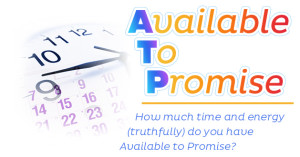Coulda Woulda Shoulda by Liisa Kyle, Ph.D.
 Note from Meggin: As women, we often engage in “Coulda, Woulda, Shoulda” thinking – and far from improving our productivity (and joy in life), it detracts from both. This list of “top tens” may be just what you need to read today – or to save for one of those days in the future when you are coulda, woulda, shoulda-ing.
Note from Meggin: As women, we often engage in “Coulda, Woulda, Shoulda” thinking – and far from improving our productivity (and joy in life), it detracts from both. This list of “top tens” may be just what you need to read today – or to save for one of those days in the future when you are coulda, woulda, shoulda-ing.
Everyone has some regrets in life. What differs is how people deal with them. When you regret something you did – or didn’t do – in the past, do you engage in wistful Coulda Woulda Shoulda thinking? Do you fret about how things might have turned out differently ‘if only‘ you would have taken a different course of action? If so, you’re hurting yourself.
Please note that I’m not talking about things you’ve done for which you need to apologize and make amends. If there’s something you can do to address what happened in the past, by all means do so. Instead, today’s topic refers to those decisions or actions you’ve made in the past about which you can do nothing to ‘fix’ the situation.
There are two main types of Coulda Woulda Shoulda situations – those involving things you did (decisions you made, actions you took, opportunities you attempted, your perceived ‘mistakes’, etc. – “if only I wouldn’t have done X…”) and those you didn’t do (missed opportunities, paths you didn’t follow, things you didn’t say when you had the chance, and so forth – “if only I would have done Y…”). No matter what has occurred in the past, any Coulda Woulda Shoulda thinking about it takes a hefty toll on you and those around you.
Costs of Coulda Woulda Shoulda
- Wasted time, energy, emotion & attention. You can’t change the past so anything you spend dwelling on it is squandered. Period.
- Creates a ‘victim’ or ‘blame’ mentality. Whether you are blaming yourself or others, you’re fostering a ‘victim’ mentality that is unpleasant and often painful.
- Devalues all that you have now. The more you’re focused on the past, the more you’re missing the present…and the opportunities to improve things now.
- Makes you more negative. The more you beat yourself up for what you did or didn’t do in the past, the more you kvetch about what might have been, the more negative you’re being in the here and now.
- Hurts your relationships. Do you enjoy listening to others bemoan the past? No one else does either. The more you express ‘Coulda Woulda Shoulda’ to others, the less delighted they are. It’s especially frustrating for people who care about you – they are helpless to make you feel better. The more you dwell on things no one can change, the worse they feel.
Yet a lot of creative people engage in Coulda Woulda Shoulda thinking…so they must be getting some apparent benefits from it…
Apparent Benefits of Coulda Woulda Shoulda
- It’s easy. Coulda Woulda Shoulda means you are reliving the past, over and over – which is much easier than (a) trying to learn from what happened or (b) trying new approaches to those situations.
- Saves you from taking risks (or any actions) today. “Oh sure I *could* submit that article/reel/painting/proposal to X…but it didn’t work out last time I tried, so what’s the point of trying again?” Coulda Woulda Shoulda thinking is a false justification for succumbing to fear or pessimism or laziness. It can paralyze your actions, squash your creativity and stifle your progress.
- Protects you from further harm or disappointments. The helpful part of your psyche uses Coulda Woulda Shoulda thinking to spare you repeating past painful experiences…yet by interfering with your current activities it is disrupting your present success and happiness.
- Self-punishment. Do you believe that if you make yourself feel bad enough about what happened for long enough, that you will be absolved somehow? It’s true that only you can forgive yourself. And that you need to forgive yourself to move on. You can do so now…or you can do so after twenty years of Coulda Would Shoulda self-flagellation. The only difference will be twenty years of feeling miserable…unnecessarily.
- Backhanded way of bragging about your abilities, while never (again) putting them to test. “I coulda been a contendah!” “I was rejected by Spielberg!” “The Random House editor loved my book but the bean-counters on the editorial committee nixed the offer.” This lets you and others see that you have been very, very close to greatness…once upon a time.
*****
Coulda Woulda Shoulda thinking can be very damaging to creative people. We’ll discuss ways to overcome it in Part Two of this article.
*****
Activity:
- What causes you Coulda Woulda Shoulda thinking? What regrets have you been holding onto for a long time?
- What does Coulda Woulda Shoulda cost you?
- What apparent benefits do you get from Coulda Woulda Shoulda thinking? What are their hidden costs?
- Turn to Part 2 of this article to review Ways to Overcome Coulda Woulda Shoulda.
*****
What about you? What costs and apparent benefits have you experienced in Coulda Woulda Shoulda thinking?
Are you struggling with too many talents, skills, ideas? You may have The Da Vinci Dilemma™! Find tools, fun quizzes, coaching, inspiration and solutions for multi-talented people at Da Vinci Dilemma.
 If you’ve ever felt you could use an extra two hours a day, or that you could finally get caught up if you had another day each week… You’re in dire need of ATP: Available to Promise – How much time & energy (truthfully) do you have Available to Promise?. You’ll learn how to apply the Available to Promise (ATP) concept to your overall life scheme to reclaim the time you so desperately need, and is available to download instantly.
If you’ve ever felt you could use an extra two hours a day, or that you could finally get caught up if you had another day each week… You’re in dire need of ATP: Available to Promise – How much time & energy (truthfully) do you have Available to Promise?. You’ll learn how to apply the Available to Promise (ATP) concept to your overall life scheme to reclaim the time you so desperately need, and is available to download instantly.





